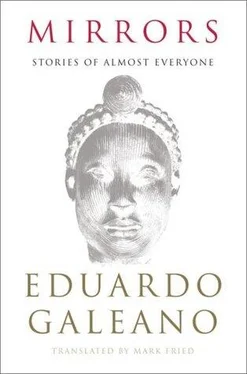That same year Chile found out that half of all Chileans are female, and Michelle Bachelet became president.
AMERICA ACCORDING TO HUMBOLDT

When the nineteenth century was taking its first baby steps, Alexander von Humboldt entered America and revealed its innards. Years later, he wrote:
• On social classes:
Mexico is the country of inequality. The monstrous inequality in rights and riches is striking. The greater or lesser degree of whiteness of skin decides the rank which man occupies in society.
• On slaves:
In no place does one feel so ashamed to be European as in the Antilles, be it the French, British, Dutch, or Spanish ones. To discuss which country treats the blacks better is like choosing between being stabbed and being skinned alive.
• On Indians:
Among all religions, none masks human unhappiness like the Christian religion. Whoever visits the ill-fated Americans living under the priests’ lash will never again want to learn anything about Europeans and their theocracy.
• On the expansion of the United States:
The North Americans’ conquests disgust me. I wish them the worst in tropical Mexico. Much better would it be if they stayed home instead of spreading their insane slavery.

That strange and valiant German was concerned about sustainable development long before it came to be called that. Everywhere he went he was astounded by the diversity of the natural world and horrified by how little respect it commanded.
On the island of Uruana in the Orinoco River, Humboldt noticed that the Indians left behind a good part of the eggs the turtles laid on the beach so that reproduction would continue. But he saw that the Europeans did not follow that wise custom, and warned their greed would endanger a rich resource that nature had placed within reach.
Why was the level of Venezuela’s Lake Valencia falling? Because the native forest had been leveled to make way for colonial plantations. Humboldt said the old trees had delayed the evaporation of rainwater, prevented soil erosion, and kept the rivers and lakes in harmonious balance. The murder of those trees was the cause of the merciless droughts and relentless floods:
“It is not just Lake Valencia,” he said. “All the region’s rivers are drying up. The mountains are deforested because the European colonists cut down the trees. The rivers are dry for much of the year, and when it rains in the mountains they become torrents that destroy the fields.”

One evening in 1867 the Brazilian ambassador pinned the Grand Crucifix of the Imperial Order of the Cross on the chest of Bolivia’s dictator Mariano Melgarejo. Melgarejo had the habit of giving away chunks of the country in return for medals or horses. That evening his eyes welled up with tears and, then and there, he gave the ambassador sixty-five thousand square kilometers of rubber-rich Bolivian jungle. With that gift, plus another two hundred thousand square kilometers seized by force, Brazil got all Bolivia’s trees that cried tears of rubber for the world market.
In 1884 Bolivia lost another war, this time against Chile. They called it the War of the Pacific, but it was the Saltpeter War. Saltpeter, a vast carpet of brilliant whiteness, was the fertilizer most coveted by Europe’s farmers and a key input for the military industry. John Thomas North, a British businessman who at parties liked to dress up as Henry VIII, polished off all the saltpeter that had belonged to Peru and Bolivia. Chile won the war, and he picked up the spoils. Peru lost a great deal, as did Bolivia, deprived of an outlet to the sea, four hundred kilometers of coastline, four ports, seven bays, and one hundred and twenty thousand square kilometers of desert rich in saltpeter.
But this many-times-mutilated country was not formally erased from the map until a diplomatic incident occurred in La Paz.
Maybe it happened or maybe not. I’ve been told the story many times and this is how it goes: Melgarejo, the drunken dictator, welcomed the representative of England by offering him a glass of chicha , a fermented corn liquor that was and remains the national drink. The diplomat thanked him and praised chicha ’s virtues, but said he would prefer hot chocolate. So the president kindly served him an immense jug of hot chocolate filled to the brim. He held the ambassador prisoner throughout the night until he finished the last drop of that punishment, and at dawn he was paraded about town sitting backward on a mule.
When Queen Victoria heard the story in Buckingham Palace, she asked for a map of the world. She then asked where the hell Bolivia was, crossed the country out with a piece of chalk, and passed sentence:
“Bolivia does not exist.”

Between 1833 and 1855 Antonio López de Santa Anna was president of Mexico eleven times.
During that period Mexico lost Texas, California, New Mexico, Arizona, Nevada, Utah, and a good chunk of Colorado and Wyoming.
For the modest sum of fifteen million dollars, and a number never counted of Indian and mestizo soldiers killed, Mexico was reduced by half.
The dismemberment began in Texas, called Tejas back then. There, slavery had been outlawed. Sam Houston led the invasion that reestablished it.
Houston and Stephen Austin and other slave-owning land-grabbers are now freedom’s heroes and founding fathers of the state. Their names speak of health and culture. The city of Houston offers cures or solace to the seriously ill, and Austin gives luster to academics.

The first volley did not kill Francisco Morazán. He got up as best he could and ordered the firing squad to take better aim.
After, the coup de grâce shattered his skull.
Central America was shattered too, into five pieces that today have become six. Those six countries, which alternately ignore and mistreat one another, were at the time of Morazán a single republic.
He led Central America from 1830 to 1838. He wanted it united and to that end he fought.
In his final battle he led eighty men against five thousand. When he entered San José de Costa Rica, bound to his saddle, a crowd watched in silence.
A short while later he was sentenced and shot and the rain continued pelting him for hours.
When Morazán was born in Honduras, there was not a single public school or hospital where the poor could go before heading for the cemetery.
In Honduras and throughout Central America, Morazán turned convents into schools and hospitals, and the high priests declared that this Satan expelled from heaven was responsible for smallpox and drought and even the war the Church waged against him.
Thirteen years after Morazán’s downfall, William Walker invaded these lands.

In 1856, William Walker proclaims himself president of Nicaragua.
The ceremony includes speeches, a military parade, a mass, and a banquet featuring fifty-three toasts of European wines.
A week later, United States Ambassador John H. Wheeler officially recognizes the new president, and his speech compares him to Christopher Columbus.
Читать дальше


















